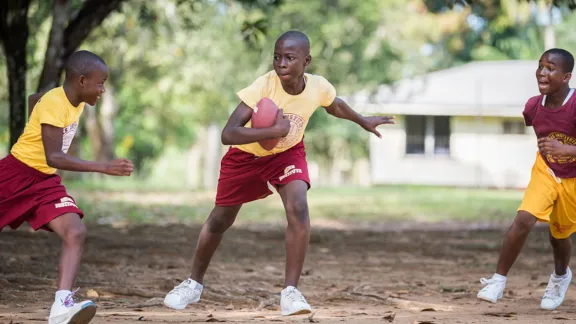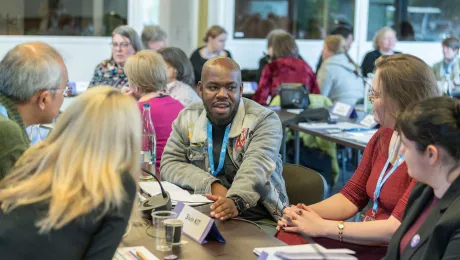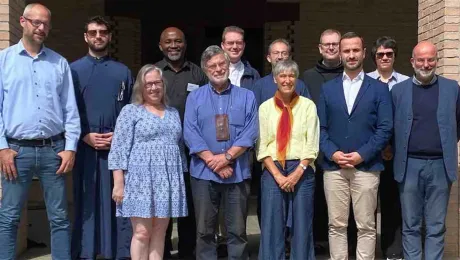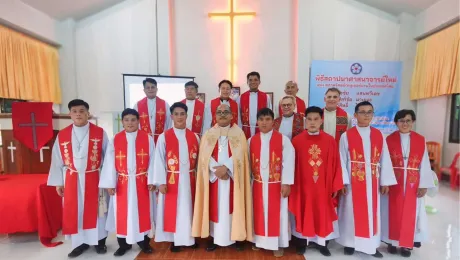
A group of students at Ricks Institute play football in the schoolyard. All photos: LWF/Albin Hillert
Churches contribute to SDGs through Waking the Giant initiative
(LWI) - Communities in Liberia, torn apart over recent years by civil war, are finding healing today through education programs that promote reconciliation alongside traditional teaching and agricultural training. Schools, that previously served as safe havens for victims of conflict, are now offering a holistic education for students from all over the West African nation.
Several of these schools are managed by members of the Liberia Council of Churches (LCC), which since 2018 has been leading the national implementation of Waking the Giant – a Lutheran World Federation initiative seeking to strengthen and connect churches’ efforts around the globe to the UN 2030 Agenda of Sustainable Development Goals (SDGs).
Holistic education – for the heart, the head and the hand
In the Liberian context, one of the areas where the churches’ diaconal ministry is particularly strong is education. A variety of LCC members run schools for children of all ages, helping to lay the educational foundation for future generations of Liberians, and thereby contributing towards SDG 4 – on Quality Education.
Mariama Z. Brown serves as principal of the Mother Tegeste Stewart Apostolic Pentecostal Mission School in Montserrado County, Liberia.

Mariama Z. Brown sits in her office at Mother Tegeste Stewart.
Today, the school provides education for 486 students from kindergarten through 12th grade. While circumstances are currently peaceful, the school bears in its memory the struggles Liberia has faced in the recent past.

Children gather around a hot meal at Mother Tegeste Stewart.
“In fact, our ministry at Mother Tegeste Stewart started during the First Liberian Civil War, in 1995, as a school for internally displaced children,” Brown explains.
And in nearby Virginia, the Liberia Baptist Convention runs Ricks Institute, a day and boarding school. While substantially older than Mother Tegeste Stewart, Ricks too is marked by recent memories of civil war.

What used to be a junior college now sits as a tarnished old building on the grounds of Ricks Institute, damaged during the latest civil war.
“During the second civil war, the plot of land owned by our school was effectively a refugee camp, hosting more than 30,000 refugees,” explains the school’s principal Dr Olu Q. Menjay.
“Today, we are back to teaching, with currently 496 students enrolled,” Menjay says.

Dr Menjay leads morning devotion at Ricks Institute.
And the school attracts students from all over Liberia, with a view to ‘holistic education’.
“At Ricks, we talk about the heart, the head, and the hand,” Menjay says. “Here, it doesn’t matter if you have money or not, as long as you have the desire to learn.”

Two female students work on a tablet together during recess at Ricks Institute.
“Our school has never strayed away from holistic education,” Menjay continues, noting how the school features alongside classes, also a range of agricultural projects in which students are involved.
“Seeing our students graduate and take part in Liberia’s private as well as public spheres is deeply rewarding,” the principal reflects.
“But I believe there is also a secret to post-war reconciliation in our teaching methodology here at Ricks,” he says.
“We have students here whose parents fought against each other during the civil wars. And whether the students are aware or not, they are now living in the same dorms, they attend the same classes, they play football together. This helps break down the perceptions of tribalism and nepotism, and is one of our success stories as an institution,” Menjay concludes.
Written by Albin Hillert.


